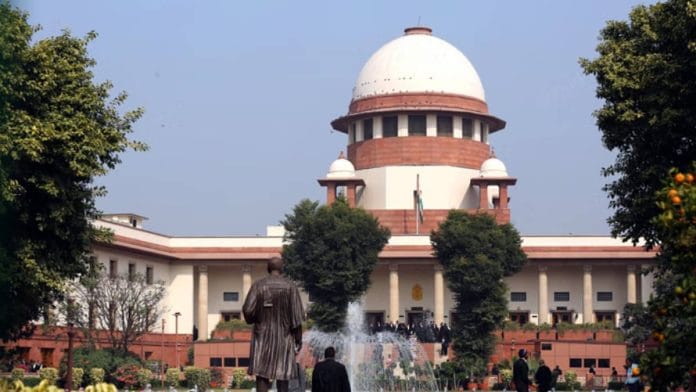New Delhi: Underlining that persons with disabilities (PwDs) must not face any discrimination in the pursuit of judicial service opportunities, the Supreme Court Monday ruled that no candidate can be denied consideration for recruitment to the judicial service solely on account of their disability.
Significantly, the decision opens up the Madhya Pradesh judicial services exams for visually impaired and low-vision candidates to participate, who were earlier excluded from appointment to the state judicial service, under Rule 6A of the Madhya Pradesh Judicial Service Examination (Recruitment and Conditions of Service) Rules 1994.
In its landmark judgment, a bench of justices J.B. Pardiwala and R. Mahadevan noted that it was high time to view the right against disability-based discrimination with the same stature as that of a fundamental right, as has been recognised in the Rights of Persons with Disabilities Act, 2016.
“Visually impaired candidates are eligible to participate in selection for the posts under the judicial service and hence, Rule 6A of the Madhya Pradesh Judicial Service (Recruitment and Conditions of Service) Rules, 1994 is struck down insofar as it excludes visually impaired and low-vision candidates for appointment in judicial service,” the apex court ruled.
Speaking to ThePrint, Rahul Bajaj, founder of Mission Accessibility, which assisted amicus curiae Gaurav Agarwal in the matter, said, “This judgment is a welcome recognition of the proposition that visual impairment cannot be the basis to disqualify a person with disability from the ambit of reservation or suitability in the judicial services.”
He added, “Secondly, the court has recognised affirmative action measures as being necessary for those with disabilities as a constitutional facet. Thirdly, they have relied on a book I published, and an entire section of the judgment is devoted to legal professionals with disabilities. It will hopefully clear the way for many other persons with disabilities to become a part of the judiciary.”
How the issue reached the top court
Notably, these observations came while the top court was hearing a challenge to the legality of Rule 6A of the Madhya Pradesh Judicial Service Examination (Recruitment and Conditions of Service) Rules 1994, which excludes visually impaired and low-vision candidates from appointment in the judicial service.
In March of last year, the court took cognisance of the matter when a letter petition dated 15 January 2024 was addressed to then Chief Justice of India D.Y. Chandrachud by the mother of a visually impaired judicial aspirant named Alok Singh.
Nearly two years ago, in June 2023, the 1994 rules were amended to exclude visually impaired and low-vision candidates from appointment to judicial service.
Saying that such a rule is arbitrary, discriminatory, unjust and violative of the Constitution’s spirit, the candidate’s mother requested the court to examine the issue and protect the interests of visually impaired candidates to ensure their right to equal opportunity and a dignified life, according to the 2016 Act.
Also Read: Ranveer Allahbadia’s relief from arrest comes with an earful from SC over ‘perverted’ language
What the court ruled
Visually impaired candidates cannot be said to be ‘not suitable’ for judicial service, the court ruled on 3 March, striking off Rule 6A of the Madhya Pradesh Judicial Service Examination (Recruitment and Conditions of Service) Rules, 1994.
By way of a 122-page ruling, the court noted that the principle of reasonable accommodation, as enshrined in several international conventions and existing jurisprudence, including the 2016 Act, mandates that accommodations should be provided to PwDs as a prerequisite to assessing their eligibility.
It added that the rights-based approach requires that those with disabilities do not face discrimination, and instead, there should be affirmative action on behalf of the state to provide an “inclusive framework”.
Any indirect discrimination that results in the exclusion of PwDs, whether through rigid cut-offs or procedural barriers, must be interfered with in order to uphold substantive equality, the court said.
It added that the commitment to ensuring equal opportunity requires “a structured and inclusive approach”, where merit is evaluated with due regard to the reasonable accommodations, which would foster judicial appointments that truly reflect the principles of fairness and justice.
“Now, it is high time that we view the right against disability-based discrimination, as recognised in the RPwD Act 2016, of the same stature as a fundamental right, thereby ensuring that no candidate is denied consideration solely on account of their disability,” the court said.
Notably, the division bench also partially struck down Rule 7 of the MP Judicial Service Exam Rules, which prescribed an additional requirement of either a three-year practice period or securing 70 percent in the first attempt, albeit only for candidates with disabilities.
Instead, it clarified that this rule will apply to PwD candidates only to the extent that it prescribes educational and other qualifications as eligibility criteria but “without the requirement of either that it should be in the first attempt or that they should have three years’ practice”. Simply put, the relaxation of this rule for PwD candidates means that they do not have to secure 70 percent in the first attempt or put in three years of practice to be eligible for this exam, but they will have to adhere to the other qualifications prescribed in Rule 7.
(Edited by Radifah Kabir)
Also Read: Ranveer Allahbadia isn’t the first. Kunal Kamra to Vir Das, many others faced legal action






